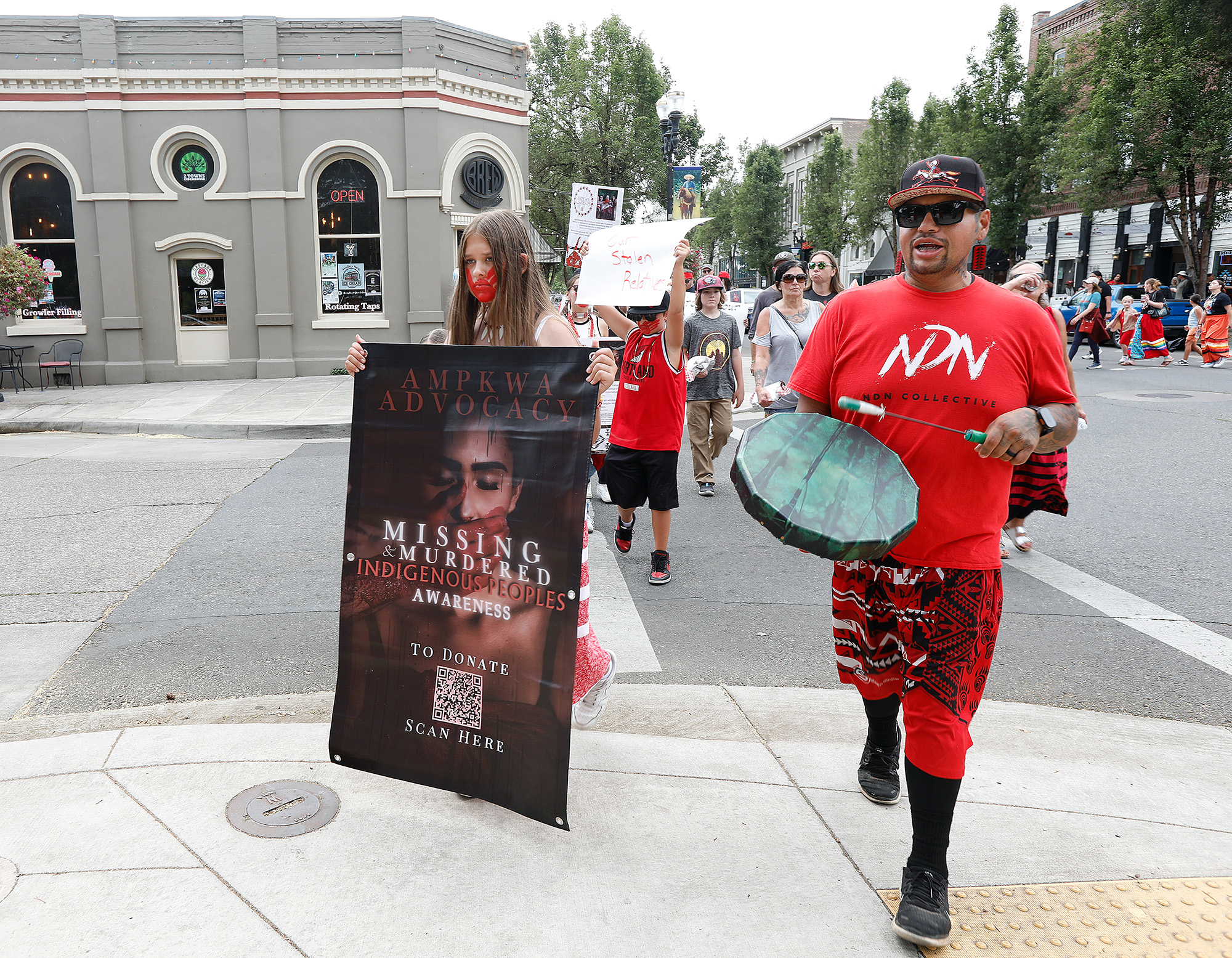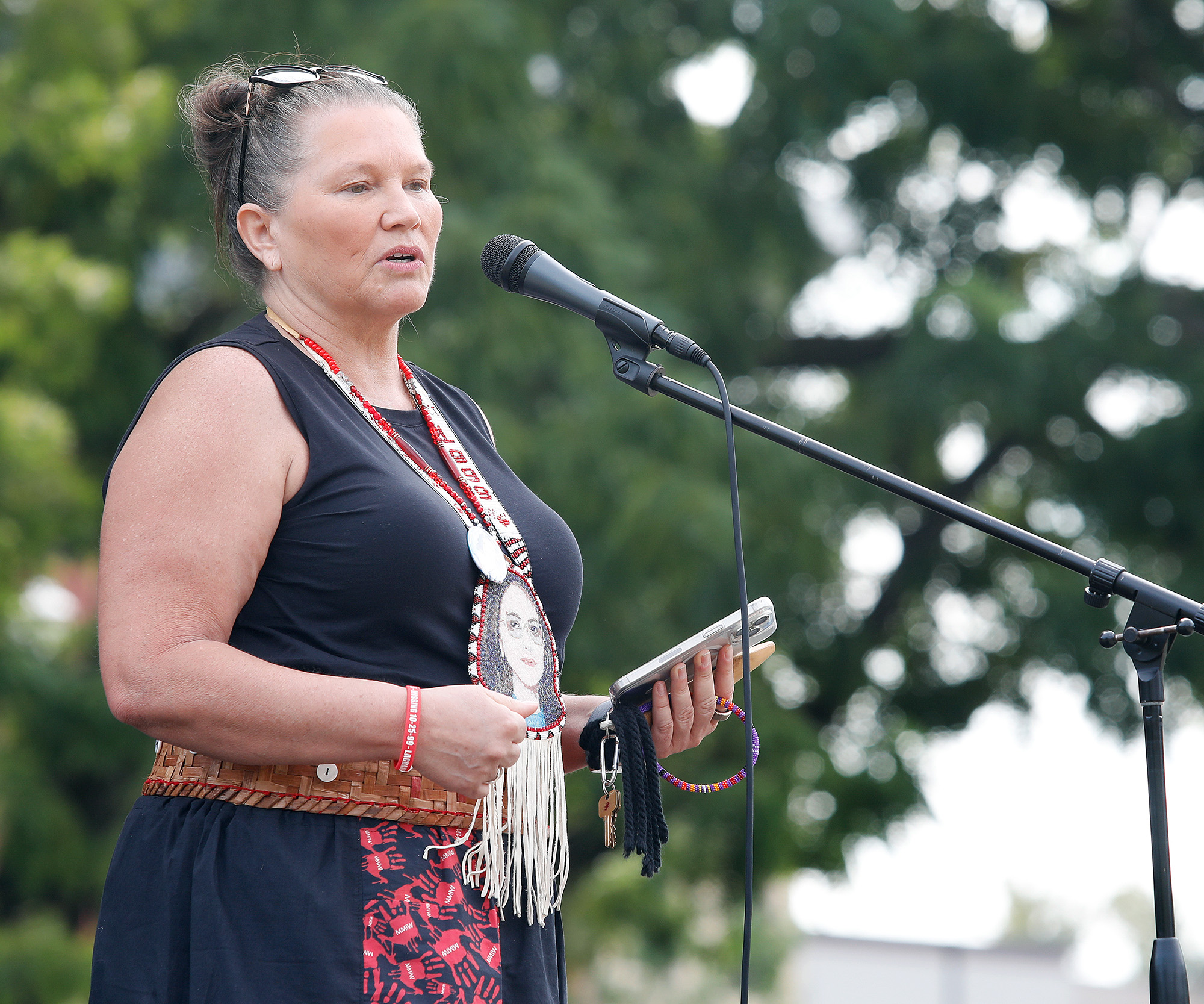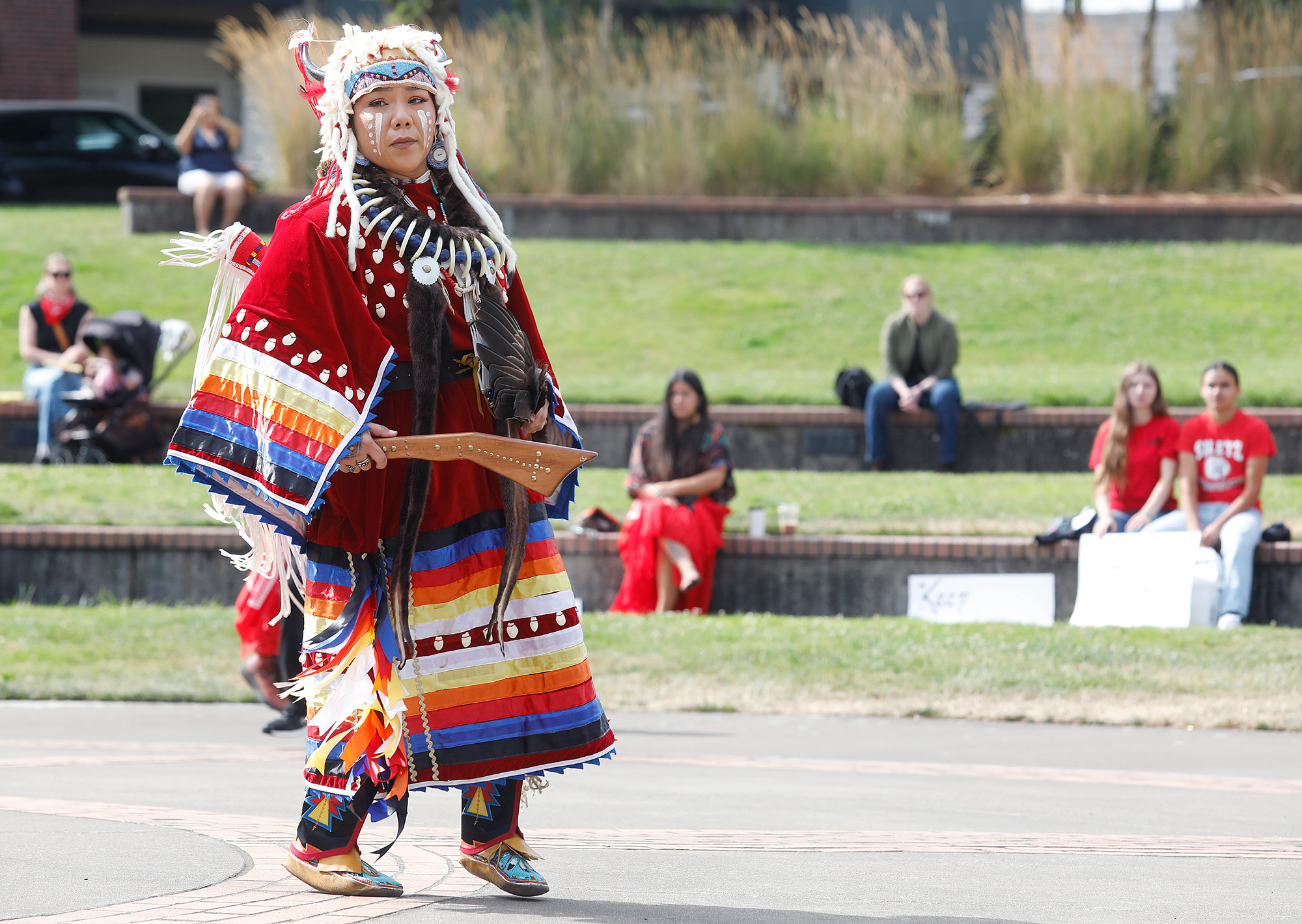Culture
MMIP walk honors missing and murdered

By Nicole Montesano
Smoke Signals staff writer
It has been 26 years since Leona LeClair Kinsey (Puyallup) of La Grande, Oregon, joined the legions of Indigenous women who have vanished without a trace. Kinsey’s daughter, Carolyn DeFord (Puyallup), is still searching for answers, a search that has also drawn her into fighting for justice for Indigenous people.
It’s why DeFord drove to Oregon to serve as the keynote speaker at Ampkwa Advocacy’s 2025 Missing and Murdered Indigenous People Awareness Walk at Riverview Park in Independence Saturday, Aug. 30.
Survivors of lost loved ones, dancers and supporters came together to remember their missing, grieve their dead and call awareness to the ongoing crisis. TikTok influencer Che Jim (Dine) was the emcee for the event. Turquoise Pride was the drum.
The group listened to speakers and enjoyed traditional Indigenous dances from both the U.S. and Mexico, before setting off on an awareness walk.

Carolyn DeFord speaks about her mother, who disappeared in 1999, as she gives the keynote speech during Ampkwa Advocacy’s 2025 Missing and Murdered Indigenous People Awareness Walk at Riverview Park in Independence Saturday, Aug. 30. DeFord is a member of the Puyallup Tribe of Indians where she serves as their anti-trafficking program manager. (Photo by Michelle Alaimo)
Many came dressed in red, some with red handprints across their faces, covering their mouths. The powerful symbol reminds viewers that the heartbreaking disappearances are caused by acts of violence, and that too often, law enforcement and media are silent.
They walked through downtown Independence, drumming, holding posters and signs with slogans including “Silence is violence,” “Keep MMIP visible,” “End the crisis,” “Honor our stolen relatives,” “Protect our native women,” “Gone but not invisible” and more. Many of the signs were marked with red handprints as well. Some walkers held signs with information about missing or murdered people.
“Our loved ones are not numbers. They are not statistics,” Tribal member and Ampqua Advocacy Founder Amanda Freeman said. “They are lives that should have been lived: Birthdays, graduations, weddings, Sunday dinners, all those small and big moments that never got to happen. The system has failed us. Too many times, families are told their missing loved one is probably out partying or on a bender … We are not disposable and our people are not disposable.”
Freeman said that more money is needed for training and investigation, but in addition to that, she said, “We need law enforcement who will take our cases seriously.”
Families and advocates will continue to demand those things, she added.
“We will not be silent, and we refuse to accept a society where our people vanish without answers,” Freeman said.
Kinsey was one of many women the walk honored. Grand Ronde Tribal Council member Matthew Haller gave the invocation for the event and played a flute song – one he said he remembers playing for his cousin, Tribal member Heather (Haller) Cameron, who went missing in August 2012, in Redding, California. Cameron made three 911 calls, pleading for help and saying she had been drugged, before she vanished.
These disappearances didn’t start recently, DeFord told the crowd. They began with colonialism, when white settlers raped Native women and when brothel owners sought out Native women for the gold miners flocking to Oregon and California, and have continued since then.
“Native women have been trafficked since colonization and it’s still happening,” DeFord said.
“It’s really a human rights issue,” Tribal member Camille Mercier, a board member of Ampkwa Advocacy and CEO of Spirit Mountain Casino, told the crowd.
She reminded them of Wilma Acosta (Pascua Yaqui), whose body was found in the Willamette River in January 2024, after she went missing the previous November.
“From the beginning, her disappearance was framed as mental health struggles, without listening to her family, friends and community,” Mercier said.
Police claimed that Acosta was suicidal, despite denials by her family, with whom she was close.
“Too often, our women are dismissed as suicidal,” Mercier said. “Our women are blamed for their own disappearance.”
Studies by the National Institute of Justice have shown that Native women face rates of murder and assault that are far higher than national averages, as well as high rates of sex trafficking.
Mercier urged the audience to “educate yourselves. Learn their names. Hold institutions accountable. Demand better training for police. Raise awareness. Keep MMIP visible. Support legislation.”
Jan Smith (Kiowa), drove up from Eugene to attend the walk, wearing red.
“I just wanted to support our missing sisters,” she said. “It’s something we all feel very strongly about and I like walks.”
Smith said the problem “is so under-acknowledged and I think that’s the thing that is so important for these walks,” calling the high statistics “shameful.”
DeFord founded Missing and Murdered Native Americans to raise awareness and support the families; she now serves on the Washington state Missing and Murdered Indigenous Women and People Task Force.
She said she faced the common problem of police indifference first-hand during the search for her missing mother. Kinsey had struggled with addiction, DeFord said, telling the audience, “To me, her addiction was terrifying. To the system, it was like, because of her lifestyle, she chose this. It was several months before her case was taken seriously.”
To a family member desperately seeking answers, DeFord said, “Every minute feels like hours. … I felt guilty for laughing or eating.”
She noted that dealing with police is often deeply frustrating.
“Too often, these systems that were meant to protect us, they respond with indifference and apathy, and add to our mistrust,” DeFord said. “When I call with a tip or a thought that may be pressing to me, I’m responded to with, ‘That’s just hearsay. We can’t do anything with that,’ like, they won’t even look into it. When we report our loved ones missing and we’re told ‘They’re probably just partying,’ or ‘Well, due to her lifestyle, it’s like finding a needle in a haystack; what do you want us to do about it?’ I want you to find the needle in the haystack. I want you to do something.”
Still, she said, if enough people speak out, change is possible. “That apathy, we’ve got to change that. Sometimes our stories, they carry; they have life and they can touch people. And they have turned people’s minds, they have changed people’s decisions and policies into being able to create safe, protected spaces.”
DeFord discussed about how Washington now issues a Missing Indigenous Person Alert, called an MIPA.
“We’ve had great success with the alert, over 100 have been issued,” she said.

Ampkwa Advocacy Co-Chair Kola Shippentower (Umatilla) demonstrates women’s traditional dancing during the 2025 Missing and Murdered Indigenous People Awareness Walk at Riverview Park in Independence Saturday, Aug. 30. (Photo by Michelle Alaimo)
In most cases, she added, “Within a couple of days, maybe a week, we get a response that that person has been located. Those MIPA alerts are the result of family members telling their stories, that we want an alert when our loved one goes out, we want a poster. We need notification. We want everybody to know. We need more tools. Sharing our voices created that. We have to demand change. It’s not going to happen if we don’t demand change, if we don’t use our voices. Share your story. I can’t emphasize that enough.”
Although she has forged a life of advocacy, DeFord has never fully recovered from her mother’s disappearance.
“Some days I can get up here and talk and do this, and other days, I’m back on day one, and I can’t get out of bed,” she said.
Violence against Native women is so pervasive that people sometimes fail to see it.
“My cousin died of domestic violence,” DeFord said. “After 21 days on life support she died of organ failure and at first, my aunt didn’t realize he murdered her.”
Part of the fight to have the crisis taken seriously, she said, is “sharing our stories as we remember them, not as the police and media portray them. … Let your stories be justice, when it doesn’t come in the Western way.”
The crisis is also tied to the massive harm that Native men have suffered from child abuse and neglect to foster care, incarceration and drug addiction, DeFord said
“This is not a women’s issue; this is a men’s issue,” she said. “We need our brothers to heal, to have spaces where they can come and feel safe.”
